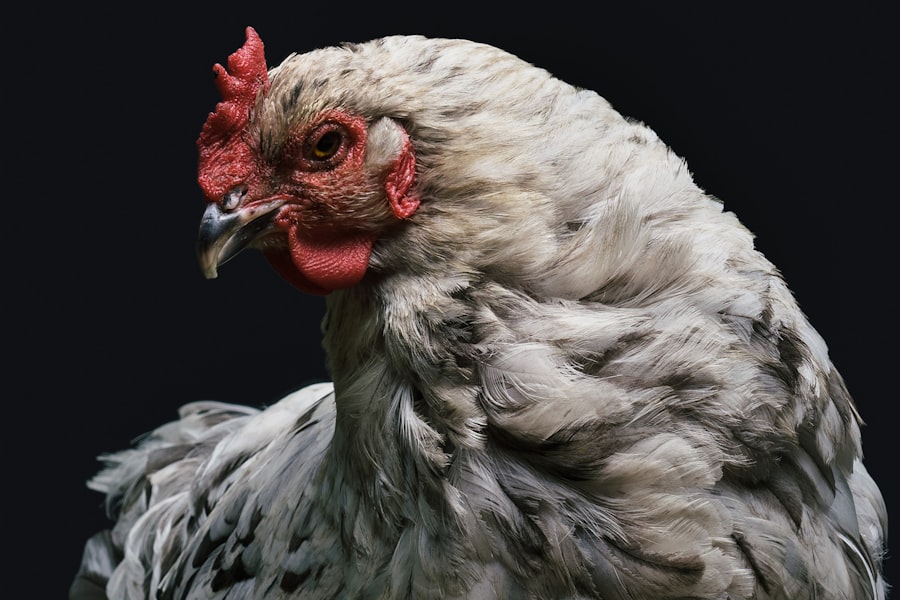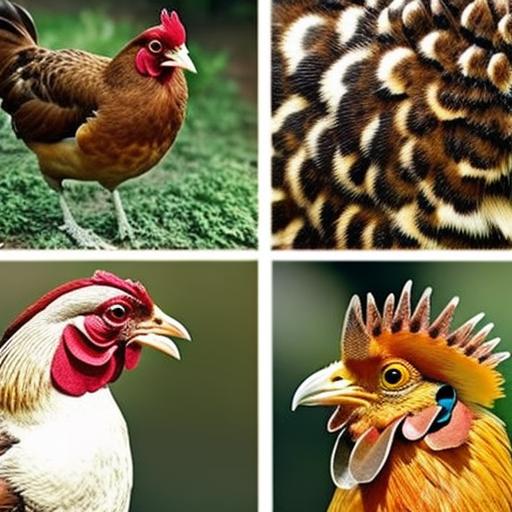Raising chickens has a long and storied history that dates back thousands of years. Chickens were first domesticated in Southeast Asia around 6000 BC, and since then, they have become one of the most widely kept animals in the world. Today, chickens are not only raised for their meat and eggs but also as pets and for exhibition purposes.
There are numerous benefits to raising chickens. First and foremost, they provide a sustainable source of food. Chickens are prolific egg layers, with some breeds capable of producing over 300 eggs per year. Additionally, chickens can be raised for meat, providing a healthy and affordable source of protein.
Furthermore, chickens are relatively low maintenance animals. They require minimal space and can be kept in urban or suburban areas with the proper permits. Chickens also have a natural ability to forage for food, reducing the need for expensive feed. Additionally, raising chickens can be a rewarding and educational experience for both children and adults alike.
Key Takeaways
- Raising chickens can be a rewarding and sustainable hobby or source of food.
- Choosing the right chicken breed depends on factors such as climate, egg-laying ability, and temperament.
- Building a chicken coop requires careful planning and consideration of factors such as size, ventilation, and predator protection.
- Essential equipment for chicken keeping includes feeders, waterers, bedding, and nesting boxes.
- Feeding and watering your chickens requires a balanced diet and clean water, with supplements such as grit and oyster shells as needed.
Choosing the Right Chicken Breed
When it comes to choosing a chicken breed, there are several factors to consider. First and foremost, you need to determine your purpose for raising chickens. If you are primarily interested in egg production, then you will want to choose a breed that is known for its high egg-laying capabilities. On the other hand, if you are more interested in meat production, then you will want to choose a breed that grows quickly and has good meat quality.
Another factor to consider is the climate in which you live. Some chicken breeds are better suited to cold climates, while others thrive in hot climates. It is important to choose a breed that is well adapted to your specific climate to ensure the health and well-being of your flock.
For beginners, there are several popular chicken breeds that are known for being easy to care for and friendly in nature. Some popular beginner breeds include the Rhode Island Red, the Plymouth Rock, and the Sussex. These breeds are known for their hardiness, good egg production, and docile temperaments.
Building a Chicken Coop
A well-built chicken coop is essential for the health and safety of your flock. When building a chicken coop, there are several materials that you will need. These include lumber for the frame, wire mesh for the walls and windows, roofing material, and nesting boxes for the hens to lay their eggs.
When designing your chicken coop, there are several considerations to keep in mind. First and foremost, you will want to ensure that the coop is secure and predator-proof. This means using sturdy materials and ensuring that there are no gaps or holes where predators can enter.
Additionally, you will want to provide adequate ventilation in the coop to prevent the buildup of moisture and ammonia from chicken waste. This can be achieved by installing windows or vents in the coop.
Keeping the coop clean is also important for the health of your flock. Regularly cleaning out the coop and replacing bedding material will help prevent the buildup of bacteria and parasites. It is also important to regularly check for signs of mites or other pests and take appropriate measures to control them.
Essential Equipment for Chicken Keeping
In addition to a well-built coop, there are several pieces of equipment that are essential for keeping chickens. These include a feeder, a waterer, and a heat source for brooding chicks.
A feeder is necessary to provide your chickens with a steady supply of food. There are several types of feeders available, including hanging feeders and trough feeders. It is important to choose a feeder that is appropriate for the size of your flock and that can be easily cleaned.
A waterer is also essential for providing clean drinking water to your chickens. There are several types of waterers available, including gravity-fed waterers and nipple waterers. It is important to choose a waterer that is easy to clean and that can provide an adequate supply of water for your flock.
For those who plan on hatching their own chicks, a heat source is necessary for brooding the chicks. This can be achieved using a heat lamp or a brooder box with a built-in heat source. It is important to provide the chicks with a warm and draft-free environment to ensure their health and well-being.
Feeding and Watering Your Chickens
Feeding your chickens a balanced diet is essential for their health and productivity. There are several types of feed available, including commercial chicken feed, scratch grains, and kitchen scraps. It is important to provide your chickens with a balanced diet that includes a mix of protein, carbohydrates, vitamins, and minerals.
Commercial chicken feed is formulated to meet the nutritional needs of chickens at different stages of life. There are different types of feed available for chicks, pullets, and laying hens. It is important to choose a feed that is appropriate for the age and purpose of your flock.
In addition to commercial feed, you can supplement your chickens’ diet with scratch grains and kitchen scraps. Scratch grains are a mix of cracked corn, wheat, and other grains that provide additional energy for your flock. Kitchen scraps such as vegetable peelings and leftover bread can also be fed to chickens, but it is important to avoid feeding them anything that is toxic or spoiled.
Providing clean water is also essential for the health of your flock. Chickens require fresh water daily, especially during hot weather. It is important to provide water in a clean container that is easily accessible to your chickens. Additionally, it is important to regularly clean and refill the water container to prevent the buildup of bacteria.
To prevent waste, it is important to use feeders and waterers that are designed to minimize spillage. Additionally, it is important to monitor your chickens’ feeding habits and adjust the amount of feed accordingly. Overfeeding can lead to obesity and other health problems, while underfeeding can result in poor egg production and slow growth.
Understanding Chicken Behavior

Understanding chicken behavior is essential for properly caring for your flock. Chickens have their own unique behaviors and social hierarchy, and it is important to be able to recognize and interpret these behaviors.
Some common chicken behaviors include scratching the ground, dust bathing, and roosting. Scratching the ground is a natural behavior that chickens use to search for food and insects. Dust bathing is another natural behavior that chickens use to keep their feathers clean and free of parasites. Roosting is the behavior of perching on a high surface, such as a roosting bar or tree branch, to sleep.
It is also important to know how to handle and interact with chickens. Chickens can be easily startled or frightened, so it is important to approach them calmly and gently. When handling chickens, it is important to support their body and avoid squeezing or dropping them. Additionally, it is important to wash your hands before and after handling chickens to prevent the spread of bacteria.
Health and Disease Prevention for Chickens
Keeping your flock healthy is essential for their well-being and productivity. There are several signs of a healthy chicken that you should look out for. These include bright eyes, clean feathers, a healthy appetite, and normal droppings.
However, chickens are susceptible to a variety of diseases and parasites that can affect their health. Some common diseases include respiratory infections, coccidiosis, and external parasites such as mites and lice. It is important to be able to recognize the signs of illness in your flock and take appropriate measures to prevent the spread of disease.
Preventing disease in your flock starts with good biosecurity practices. This includes keeping your coop clean and free of waste, regularly disinfecting equipment and surfaces, and quarantining new birds before introducing them to your flock. Additionally, it is important to provide your chickens with a balanced diet, clean water, and a stress-free environment to help boost their immune system.
Egg Laying and Collecting
Chickens are known for their ability to lay eggs, and understanding the egg-laying process is essential for maximizing egg production. On average, chickens start laying eggs around 5-6 months of age, although this can vary depending on the breed and individual bird.
The frequency of egg laying can also vary depending on the breed and individual bird. Some breeds are known for their high egg-laying capabilities and can produce over 300 eggs per year, while others may only lay a few dozen eggs per year.
Collecting eggs is a simple process that should be done daily to ensure the freshness and quality of the eggs. It is important to handle the eggs gently to avoid cracking or damaging them. Additionally, it is important to clean the eggs if they are dirty, as dirt and bacteria can penetrate the shell and contaminate the egg.
If you find yourself with an excess of eggs, there are several options for what to do with them. You can consume them yourself, give them away to friends and family, or even sell them at a local farmers market or through a community-supported agriculture (CSA) program.
Chicken Breeding and Incubation
Breeding chickens can be a rewarding experience that allows you to expand your flock and potentially hatch your own chicks. To breed chickens, you will need a rooster and hens of breeding age. It is important to choose healthy birds with good genetics to ensure the health and productivity of the offspring.
Once the hens have been successfully bred, they will begin laying fertilized eggs. These eggs can be collected and incubated to hatch chicks. Incubation is the process of artificially maintaining the conditions necessary for eggs to develop and hatch.
There are several methods of incubation, including using a commercial incubator or a broody hen. A broody hen is a hen that has a strong maternal instinct and will sit on a clutch of eggs to keep them warm and facilitate their development. If you choose to use a broody hen, it is important to provide her with a quiet and secure nesting area.
Caring for chicks is similar to caring for adult chickens, but there are some additional considerations. Chicks require a warm and draft-free environment, so it is important to provide them with a heat source such as a heat lamp or brooder box. Additionally, chicks require a specialized diet that is high in protein to support their rapid growth and development.
Troubleshooting Common Chicken Problems
While raising chickens can be a rewarding experience, it is not without its challenges. There are several common problems that chicken keepers may encounter, but with proper knowledge and preparation, these problems can be easily solved.
Some common issues include egg-eating, feather pecking, and egg binding. Egg-eating occurs when chickens develop a taste for eggs and start breaking and eating them. This can be prevented by providing adequate nesting boxes with soft bedding material and collecting eggs regularly.
Feather pecking is a behavior where chickens peck at each other’s feathers, often resulting in injury or feather loss. This behavior can be caused by overcrowding, boredom, or nutritional deficiencies. Providing adequate space, environmental enrichment, and a balanced diet can help prevent feather pecking.
Egg binding occurs when a hen is unable to lay an egg due to an obstruction in the reproductive tract. This can be a life-threatening condition that requires immediate veterinary care. To prevent egg binding, it is important to provide your hens with a balanced diet, clean water, and regular exercise.
Raising chickens can be a rewarding and fulfilling experience that provides numerous benefits. From a sustainable source of food to educational opportunities, there are many reasons to consider raising chickens. By choosing the right breed, building a well-designed coop, and providing the necessary equipment and care, you can successfully raise a healthy and productive flock.
While there may be challenges along the way, with proper knowledge and preparation, these challenges can be overcome. By understanding chicken behavior, practicing good biosecurity, and providing a balanced diet and clean environment, you can keep your flock healthy and productive.
So why not give it a try? Whether you are interested in fresh eggs, meat production, or simply the joy of having chickens as pets, raising chickens is a rewarding and enjoyable hobby. With the right resources and support, you can embark on your own chicken-raising adventure.
If you’re interested in books on keeping chickens, you might also find this article on chicken coop designs in Muskegon helpful. It provides valuable insights and tips on creating a comfortable and functional living space for your feathered friends. Whether you’re a beginner or an experienced chicken keeper, having a well-designed coop is essential for the health and happiness of your flock. Check out the article here to learn more about creating the perfect chicken coop.
FAQs
What are some good books on keeping chickens?
There are many good books on keeping chickens, including “Storey’s Guide to Raising Chickens” by Gail Damerow, “The Chicken Health Handbook” by Gail Damerow, and “The Joy of Keeping Chickens” by Jennifer Megyesi.
What topics do books on keeping chickens cover?
Books on keeping chickens cover a wide range of topics, including choosing the right breed, building a coop, feeding and caring for chickens, and dealing with common health issues.
Are there any books specifically for beginners?
Yes, there are several books specifically for beginners, such as “Chick Days” by Jenna Woginrich and “The Beginner’s Guide to Raising Chickens” by Anne Kuo.
Can books on keeping chickens help me save money?
Yes, books on keeping chickens can help you save money by teaching you how to build your own coop, make your own feed, and care for your chickens in a way that prevents common health issues.
Are there any books on keeping chickens that focus on organic methods?
Yes, there are several books on keeping chickens that focus on organic methods, such as “The Organic Chicken Handbook” by Anne Kuo and “Fresh Eggs Daily” by Lisa Steele.
Meet Walter, the feathered-friend fanatic of Florida! Nestled in the sunshine state, Walter struts through life with his feathered companions, clucking his way to happiness. With a coop that’s fancier than a five-star hotel, he’s the Don Juan of the chicken world. When he’s not teaching his hens to do the cha-cha, you’ll find him in a heated debate with his prized rooster, Sir Clucks-a-Lot. Walter’s poultry passion is no yolk; he’s the sunny-side-up guy you never knew you needed in your flock of friends!







